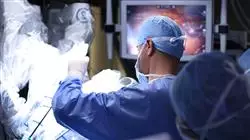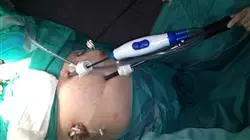University certificate
The world's largest faculty of medicine”
Introduction to the Program
This program will give you a sense of confidence when taking decisions and providing care, which will help you grow both personally and professionally”

The increasing complexity of the procedures that are performed laparoscopically has reached a point where practically 95% of gynecological operations can be performed by minimally invasive surgery, so keeping up to date with the latest techniques is vital for proper patient care. In addition to all this, instruments and new tools are constantly being developed and must be known for greater surgical efficiency and best clinical results.
The program aims to provide an update with the use of the latest educational technology, to contribute with quality and safety to medical decision-making, diagnosis, treatment and prognosis of the patient with gynecological pathology, which can be carried out by minimally invasive surgery.
In addition, the teaching staff includes recognized international experts in Minimally Invasive Gynecologic Surgerytechniques. Accumulating numerous merits and outstanding advances in techniques such as Uterine Transposition, the specialist will be able to access a series of illustrative Masterclasses that reinforce the practical knowledge reviewed throughout the syllabus.
Therefore, this university program has been designed to provide instruction equivalent to 1,500 hours of study, in which all theoretical and practical knowledge is presented through high-quality multimedia content, analysis of clinical cases prepared by experts, masterclasses and video techniques that allow the exchange of knowledge and experience. All this through a 100% online methodology, which allows you to make your life compatible at the same time as you learn.
Take the opportunity to learn about the latest advances in this field in order to apply it to your daily practice"
This Professional master’s degree in Minimally Invasive Gynecologic Surgery contains the most complete and up-to-date scientific program on the market. The most important features include:
- More than 75 clinical cases presented by experts in Minimally Invasive Gynecologic Surgery
- Its graphic, schematic and practical contents, with which they are conceived, gather scientific and assistance information on those disciplines that are essential for professional practice
- Diagnostic/therapeutic developments in assessment, diagnosis and intervention in Minimally Invasive Gynecologic Surgery
- Contains practical exercises, where the process of self-assessment can be carried out to improve learning
- Iconography of clinical and diagnostic imaging tests
- An algorithm-based interactive learning system for decision-making in the clinical situations presented throughout the course
- With special emphasis on evidence-based medicine and research methodologies in Minimally Invasive Gynecologic Surgery
- All of this will be complemented by theoretical lessons, questions to the expert, debate forums on controversial topics, and individual reflection assignments
- Content that is accessible from any fixed or portable device with an Internet connection
This Professional master’s degree is the best investment you can make when selecting a refresher program, for two reasons: in addition to updating your knowledge in Minimally Invasive Gynecologic Surgery, you will obtain a certificate issued by TECH Global University”
The teaching staff includes professionals from the field of Minimally Invasive Gynecologic Surgery, who bring their experience to this program, as well as renowned specialists from leading scientific societies.
Thanks to its multimedia content, developed with the latest educational technology, it will allow the professional a situated and contextual learning, that is to say, a simulated environment that will provide an immersive learning, programmed to train in real situations.
This program is designed around Problem-Based Learning, whereby, the physicians must try to solve the different professional practice situations that arise throughout the program. For this purpose, physicians will be assisted by an innovative, interactive video system created by renowned and experienced experts in the field of Minimally Invasive Gynecologic Surgery with extensive teaching experience.
This Professional master’s degree offers education in simulated environments, which provides an immersive learning experience designed to prepare for real-life situations"

You will have access to exhaustive and detailed Masterclasses on the most relevant laparoscopic and robotic techniques currently used in Minimally Invasive Gynecologic Surgery"
Why study at TECH?
TECH is the world’s largest online university. With an impressive catalog of more than 14,000 university programs available in 11 languages, it is positioned as a leader in employability, with a 99% job placement rate. In addition, it relies on an enormous faculty of more than 6,000 professors of the highest international renown.

Study at the world's largest online university and guarantee your professional success. The future starts at TECH”
The world’s best online university according to FORBES
The prestigious Forbes magazine, specialized in business and finance, has highlighted TECH as “the world's best online university” This is what they have recently stated in an article in their digital edition in which they echo the success story of this institution, “thanks to the academic offer it provides, the selection of its teaching staff, and an innovative learning method aimed at educating the professionals of the future”
A revolutionary study method, a cutting-edge faculty and a practical focus: the key to TECH's success.
The most complete study plans on the university scene
TECH offers the most complete study plans on the university scene, with syllabuses that cover fundamental concepts and, at the same time, the main scientific advances in their specific scientific areas. In addition, these programs are continuously being updated to guarantee students the academic vanguard and the most in-demand professional skills. In this way, the university's qualifications provide its graduates with a significant advantage to propel their careers to success.
TECH offers the most comprehensive and intensive study plans on the current university scene.
A world-class teaching staff
TECH's teaching staff is made up of more than 6,000 professors with the highest international recognition. Professors, researchers and top executives of multinational companies, including Isaiah Covington, performance coach of the Boston Celtics; Magda Romanska, principal investigator at Harvard MetaLAB; Ignacio Wistumba, chairman of the department of translational molecular pathology at MD Anderson Cancer Center; and D.W. Pine, creative director of TIME magazine, among others.
Internationally renowned experts, specialized in different branches of Health, Technology, Communication and Business, form part of the TECH faculty.
A unique learning method
TECH is the first university to use Relearning in all its programs. It is the best online learning methodology, accredited with international teaching quality certifications, provided by prestigious educational agencies. In addition, this disruptive educational model is complemented with the “Case Method”, thereby setting up a unique online teaching strategy. Innovative teaching resources are also implemented, including detailed videos, infographics and interactive summaries.
TECH combines Relearning and the Case Method in all its university programs to guarantee excellent theoretical and practical learning, studying whenever and wherever you want.
The world's largest online university
TECH is the world’s largest online university. We are the largest educational institution, with the best and widest online educational catalog, one hundred percent online and covering the vast majority of areas of knowledge. We offer a large selection of our own degrees and accredited online undergraduate and postgraduate degrees. In total, more than 14,000 university degrees, in eleven different languages, make us the largest educational largest in the world.
TECH has the world's most extensive catalog of academic and official programs, available in more than 11 languages.
Google Premier Partner
The American technology giant has awarded TECH the Google Google Premier Partner badge. This award, which is only available to 3% of the world's companies, highlights the efficient, flexible and tailored experience that this university provides to students. The recognition as a Google Premier Partner not only accredits the maximum rigor, performance and investment in TECH's digital infrastructures, but also places this university as one of the world's leading technology companies.
Google has positioned TECH in the top 3% of the world's most important technology companies by awarding it its Google Premier Partner badge.
The official online university of the NBA
TECH is the official online university of the NBA. Thanks to our agreement with the biggest league in basketball, we offer our students exclusive university programs, as well as a wide variety of educational resources focused on the business of the league and other areas of the sports industry. Each program is made up of a uniquely designed syllabus and features exceptional guest hosts: professionals with a distinguished sports background who will offer their expertise on the most relevant topics.
TECH has been selected by the NBA, the world's top basketball league, as its official online university.
The top-rated university by its students
Students have positioned TECH as the world's top-rated university on the main review websites, with a highest rating of 4.9 out of 5, obtained from more than 1,000 reviews. These results consolidate TECH as the benchmark university institution at an international level, reflecting the excellence and positive impact of its educational model.” reflecting the excellence and positive impact of its educational model.”
TECH is the world’s top-rated university by its students.
Leaders in employability
TECH has managed to become the leading university in employability. 99% of its students obtain jobs in the academic field they have studied, within one year of completing any of the university's programs. A similar number achieve immediate career enhancement. All this thanks to a study methodology that bases its effectiveness on the acquisition of practical skills, which are absolutely necessary for professional development.
99% of TECH graduates find a job within a year of completing their studies.
Professional Master's Degree in Minimally Invasive Gynecologic Surgery
Updating oneself in an area such as gynecology is indispensable, especially when it comes to surgical interventions whose success depends on the physician's skills. Performing a uterine perforation to correct endometriosis or genital malformation syndrome is a task that requires specialized skills. That is why, on this occasion, TECH Global University brings a program of extraordinary educational value that breaks down in detail procedures such as laparoscopy, hysteroscopy or endoscopic surgery for oncological pathologies. It is the Professional Master's Degree in Minimally Invasive Gynecologic Surgery, a 100% online program that combines highly efficient educational methodologies with an advanced platform of medical digital files that you will not find anywhere else. It lasts one year, during which you will not only have the mentoring of excellent professors, but you will also be able to manage your own schedule. Both general topics (asepsis and antisepsis, preparation of the surgical field) and specific advanced topics (urological complications, robotic systems for surgery) are explained. Do you want to grow professionally in the hospital sector? Then this postgraduate program is for you.
Get qualified in minimally invasive gynecologic surgeries
Surgical procedures involving minimally invasive procedures such as laparoscopy are increasingly recurrent, due to their small incisions and practices that lead to a quick recovery time, with less postoperative pain and an aesthetic result on the skin. In gynecology this method is of significant utility to address issues such as: preoperative assessment of adnexal masses, cystectomy and adnexectomy in benign ovarian tumor, or the management of complex non-endometriotic adnexal cysts. By accessing our Professional Master's Degree you will be able to learn about the above concepts and incorporate others to your competence canon: electrosurgery, pelvic floor pathology and use of vaginal mesh, benign uterine pathology and dysgenesis, endometriosis, gynecological cancers, among other interesting approaches that will be explained in ten modules. Thanks to the curricular flexibility and technological immersion provided by our platform, you will achieve an excellent command in a field that is widely requested at the clinical level. Do not hesitate and join the best online university in the world.







